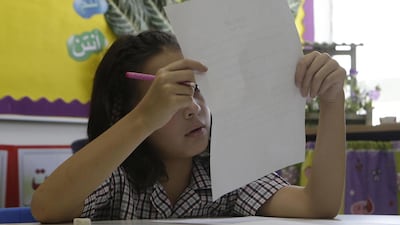ABU DHABI // Schools lack good teachers of Arabic and teaching styles must change with today’s needs, linguists and educators say.
Making the teaching of Arabic more interactive and engaging is pivotal to improving learning.
Although there have been positive changes in recent years, much more needs to be done, according to Shireen Sinno, manager at the Arabic Learning Centre.
“In the past few years, some UAE schools started integrating more interactive teaching methods and employing supplementary materials that presented Arabic in a more functional way,” she said.
Even so, there should be greater focus on the needs of pupils in the teaching of Arabic, said Ms Sinno.
“Teaching materials need to connect theoretical knowledge with practical knowledge, so students are exposed to how Arabic is used in real-life situations,” she said.
Although expatriate parents recognised the importance of having their children learn Arabic, many were “quite concerned with their children’s perception of the Arabic language and their level of interest in it”.
Maha Jayyusi, director of studies at Dar el-ilm School of Languages, said the number of expats who wished to learn Arabic had risen in recent years and recognition of the language’s importance was “evident but not as prominent as it needs to be”.
“Teaching methodology needs to adapt to a 21st century educational culture, and parents need to support their children and encourage them to learn Arabic,” Ms Jayyusi said.
“This inspires students to want to learn it.”
Brendon Fulton, principal of Dubai British School, said schools should pay more attention to the recruitment and development of staff to improve the standard of Arabic taught in schools.
“Students should feel excited to go to their Arabic lessons, rather than feeling they are going through the motions of a compulsory subject that they don’t engage with,” he said.
“Once a school changes its philosophy on the teaching of Arabic to a positive one, as a subject that is hugely beneficial to its students, development is inevitable.
“Children love learning, so the challenge for schools is to make sure that the teaching of Arabic brings about meaningful and relevant learning.”
Imad Nasr, director of Arabic and Islamic studies at Jumeira Baccalaureate School, said learning Arabic should be a joy, not a chore. “We don’t want to make learning Arabic seem a big challenge for children. We must have activities in the school and the classroom, so Arabic seems a familiar and friendly subject, like English or maths,” he said.
But finding the right calibre of teachers and teaching the language is challenging.
“Arabic teachers come from different backgrounds or are used to certain teaching methods, like lecturing, which would not work in schools here,” he said.
“Most Arabic teachers studied subjects like language and literature at university, not education,” said Mr Nasr.
“When teachers come to the UAE or the UK from other countries, they have special qualifications. But I would say 80 per cent of Arabic teachers are learning how to teach through their classroom experiences.
“With students, especially in Dubai, they speak English everywhere. Unfortunately, even some native Arabic speakers use English with their friends. When they only use Arabic in the classroom, it becomes a challenge.
“We also have standards that must be taught and met, so many teachers turn to traditional methods just to fill students’ heads with information because they don’t have time to introduce activities.”
newsdesk@thenational.ae

